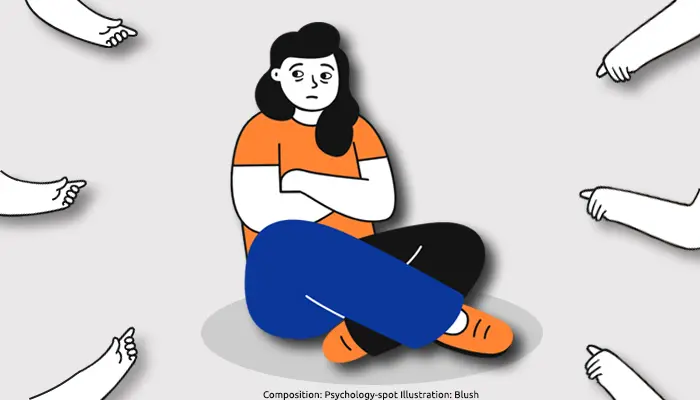
The culprits of the murders are the murderers. The culprits of the violations are the rapists. The culprits of thefts are the thieves. It’s simple. But sometimes the lines blur and we fall into the boggy terrain of blaming the victim.
The level of guilt obviously varies. Blaming the victim takes on many dimensions and has many nuances. There are those who put all the responsibility for what happened on the victim and those who only confer a minimum part of the blame on them. There are those who think that the victim could have acted in another way to avoid the aggression, as if he/she had had a crystal ball to predict what was going to happen.
Obviously, it is not always possible to explicitly blame the victim by making strong statements about his/her responsibility in the facts, since society tends to condemn such positions. In these cases, people resort to more subtle blaming strategies, as demonstrated by a study carried out at Brock University, attributing the act to behaviors that the victims can control. So there are those who blame the victim for his/her supposed “recklessness” and those who blame him/her for his/her naivety.
Why do we blame the victims instead of supporting them?
The tendency to blame the victim often stems from the belief in a just world. In fact, it has been found that the belief in a just world can make us more insensitive to the suffering of others.
Despite the fact that justice does not exist in the animal world or in nature, we believe that the world and what happens to us obey certain laws of universal justice. We all harbor the unconscious idea that people deserve what happens to them – both the good and the bad. Thinking that horrible things happen to good people calls into question that belief and causes us great discomfort.
To avoid cognitive dissonance, we prefer to look for an alternative explanation, find a logical meaning for what happened, preferably one that is comforting and fits into our vision of that fair world. We prefer not to think that some things happen by unfortunate chance and we look for a reason that satisfies our belief that bad things, in a certain way, are a kind of punishment.
If we would think that the world is a chaotic and unfair place, we would have to admit the possibility that anyone could be the victim of a tragedy. Our parents, our children, our partner or ourselves. Believing in that universal justice feeds an illusory sense of security. It helps us to think that these terrible things will not happen to us, because we know how to take the appropriate measures, we are smarter or more cautious.
For example, we can think: “If he hadn’t taken out his wallet, they wouldn’t have snatched it from his hands”, “If she had chosen a safer street, she wouldn’t have been assaulted” or “If he had installed an alarm, she wouldn’t have been robbed at home”.
Blaming the victim makes us feel more secure because we believe we are in control of the situation. It conveys the conviction that if we do not act in the same way or are not like that, the same will not happen to us. For this reason, we tend to think that the responsibility lies with the person who has suffered the aggression.
Finally, it all comes down to the idea that if we do the “right thing,” we will be safe. Therefore, when we blame the victim, what we are really doing is seeking safety in a world that we unconsciously perceive as too chaotic, hostile or unfair.
The pain caused by revictimization
Worst of all, the more brutal the act, the greater the tendency to blame the victim because the more we need to look for answers and feel safe. In fact, a study conducted at Franklin Pierce University revealed that feelings of powerlessness and helplessness in women tend to increase the blaming phenomenon of victims of sexual assault.
Without realizing it, these kinds of blame thoughts, especially when shared publicly, are another way of holding the victim accountable. Therefore, they become a second act of violence.
In fact, questioning the crime or the extent of the harm is often an impediment to healing. A society that blames the person who has suffered revictimizes that person over and over again, making it more difficult for him/her to overcome the traumatic situation.
This re-victimization also prevents thousands of people from denouncing the abuse they have suffered or not even daring to tell those closest to them since they do not know if they will find the support and emotional validation they need. That is why many people suffer in silence their psychological traumas.
When the victim is blamed, not only his/her emotions are invalidated, but also his/her experiences, right at one of his/her most vulnerable moments and when he/she needs the most support. Focusing on the victim not only diverts the accusation of the aggressor, but can even make the victim doubt himself/herself and assume that it was his/her fault. Thus, without intending to, we can end up justifying the unjustifiable.
However, the most terrible thing that can happen to someone who has suffered an assault is to feel judged, criticized, blamed and invalidated. That’s why all of us, without exception, need to question our motivations and pay more attention to our words, to make sure we don’t create more pain and, instead, become that safe haven that victims need.
Sources:
Hafer, C. L. et. Al. (2019) Experimental evidence of subtle victim blame in the absence of explicit blame. PLoS One; 14(12): e0227229.
Gravelin, C. et. Al. (2017) The impact of power and powerlessness on blaming the victim of sexual assault. Group Processes & Intergroup Relations; 22(1): 10.1177.



